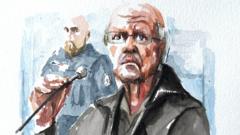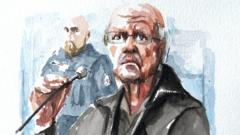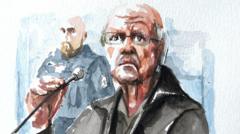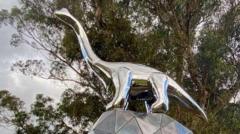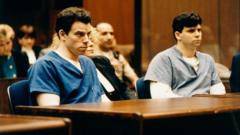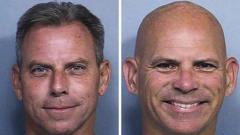After spending over 30 years in prison for the notorious murders of their parents, Lyle and Erik Menendez are cautiously optimistic about their upcoming parole hearings, expressing newfound hope and a desire for rehabilitation.
Menendez Brothers Express Optimism for Parole After Decades in Prison

Menendez Brothers Express Optimism for Parole After Decades in Prison
Lyle and Erik Menendez share renewed hope as their parole hearing approaches, reflecting on personal growth during incarceration.
The Menendez brothers, now in their 50s, have indicated that the prospect of parole offers a glimmer of hope that they have not allowed themselves to entertain before. In a recent interview with TMZ, 57-year-old Lyle stated, "My brother and I are cautiously hopeful... Hope for the future is really kind of a new thing for us." The brothers have been incarcerated since their conviction for the brutal murder of their parents, Kitty and Jose Menendez, in 1989. Initially, their case garnered national attention not just for the horrific nature of the crime, but also due to the dramatic courtroom battles that ensued.
Convicted in 1996, their first trial ended in a hung jury after both brothers alleged they had endured sexual abuse from their father, a music industry executive. However, the prosecution countered that their motives stemmed from a desire for inheritance. The ensuing conviction led to a life sentence without the chance of parole.
Now, with an upcoming parole hearing in June and a resentencing hearing scheduled for April, the brothers are envisioning what life could look like if they were released. Erik Menendez, 54, expressed a commitment to advocacy, stating, "I want to be an advocate for people that are suffering in silence," emphasizing that any future role would build upon their current contributions within the prison system.
Their hopes for parole are contingent on a risk assessment, evaluating their transformation during confinement. Both brothers have actively engaged in rehabilitation efforts, running programs for disabled inmates and teaching classes on trauma healing. Erik noted the satisfaction of helping others, stating, "Our best moments... are when we just help somebody."
Despite their newfound optimism, the road to potential freedom is fraught with uncertainty, particularly following a controversial decision by Los Angeles County District Attorney Nathan Hochman. He has withdrawn support for a resentencing motion, asserting he will oppose any efforts for their release. This decision has sparked internal conflict within the DA's office, especially among those who previously supported the brothers’ case for mercy. Family members of the Menendez brothers have expressed frustration with Hochman's approach, suggesting biases influence his actions.
Public opinion is split, with some critics labeling the Menendez brothers as manipulative and untrustworthy, casting doubt on their claims of rehabilitation. Former investigators from the original case assert that the brothers acted out of greed, calling attention to their privileged upbringing.
As they prepare for their legal battles, the Menendez brothers remain resolute. Lyle concluded, "You never know how long you'll be blessed to be on the Earth, so we don't sit around waiting for something," underscoring their commitment to forge a path forward, regardless of their uncertain future.
Convicted in 1996, their first trial ended in a hung jury after both brothers alleged they had endured sexual abuse from their father, a music industry executive. However, the prosecution countered that their motives stemmed from a desire for inheritance. The ensuing conviction led to a life sentence without the chance of parole.
Now, with an upcoming parole hearing in June and a resentencing hearing scheduled for April, the brothers are envisioning what life could look like if they were released. Erik Menendez, 54, expressed a commitment to advocacy, stating, "I want to be an advocate for people that are suffering in silence," emphasizing that any future role would build upon their current contributions within the prison system.
Their hopes for parole are contingent on a risk assessment, evaluating their transformation during confinement. Both brothers have actively engaged in rehabilitation efforts, running programs for disabled inmates and teaching classes on trauma healing. Erik noted the satisfaction of helping others, stating, "Our best moments... are when we just help somebody."
Despite their newfound optimism, the road to potential freedom is fraught with uncertainty, particularly following a controversial decision by Los Angeles County District Attorney Nathan Hochman. He has withdrawn support for a resentencing motion, asserting he will oppose any efforts for their release. This decision has sparked internal conflict within the DA's office, especially among those who previously supported the brothers’ case for mercy. Family members of the Menendez brothers have expressed frustration with Hochman's approach, suggesting biases influence his actions.
Public opinion is split, with some critics labeling the Menendez brothers as manipulative and untrustworthy, casting doubt on their claims of rehabilitation. Former investigators from the original case assert that the brothers acted out of greed, calling attention to their privileged upbringing.
As they prepare for their legal battles, the Menendez brothers remain resolute. Lyle concluded, "You never know how long you'll be blessed to be on the Earth, so we don't sit around waiting for something," underscoring their commitment to forge a path forward, regardless of their uncertain future.




